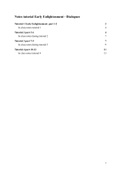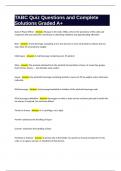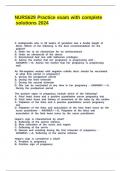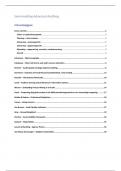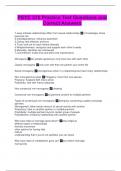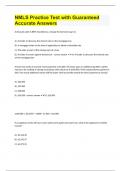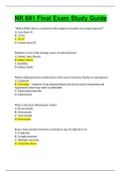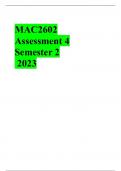Notes tutorial Early Enlightenment - Dialogues
Tutorial 1 Early Enlightenment: part 1-2 2
In-class notes tutorial 1 4
Tutorial 2 part 3-6 4
In-class notes during tutorial 2 7
Tutorial 3 part 7-9 7
In-class notes during tutorial 3 9
Tutorial 4 part 10-12 11
In class notes tutorial 4 13
1
, Tutorial 1 part 1-2
List of concepts
Theism: one powerful God exists, created the universe and remains active and present
answering prayers to mankind
Deism: one powerful God exists, created the universe but does not remain active nor present
answering prayers to mankind
Atheism: God does not exist
Fideism: exclusive or basic reliance upon faith alone → faith rather than reason
Scepticism: knowledge is limited because of the limitations of mind/inaccessibility of its
object
o Pyrrhonism: species of excessive scepticism set out to destroy all claims to
real knowledge
o Academics: distinguishes between claims to probable knowledge that we
must accept as a basis for action and life, philosophical/religious →
ungraspable
Stoicism: system of logic (rivalry to Epicureanism) → everything is reason, virtue is the
highest good of life → virtue = eudaimonia
Epistemology: philosophical study of nature, origin and limits of human knowledge
Ontology: philosophical study of being in general
Analogy: comparison between two objects that highlights why they are similar
A priori: derived by reasoning from self-evident propositions (no reference to experience),
deduction
A posteriori: reasoning/knowledge which proceeds from observations
Providence: the quality in divity on which humankind bases the belief in a benevolent
intervention in human affairs and the affairs of the world
Causa sui: self-caused cause, something tha tis generated within itself (God ?)
Teleology: any system attempting to explain a series of events in terms of ends, goals, or
purposes → opposed to mechanism
Letter from Pamphilus to Hermippus
Dialogue form hasn’t been much used in recent times, didn’t succeed because:
1) Hardly natural to present a system in conversation
2) Departing from direct style of composition leads to the loss of precision
Dialogue writing, however, is suitable for two subjects:
1) Anything that is so obvious that it can hardly be questioned
2) Any question of philosophy that is so obscure and uncertain → made for dialogue
Dialogue can unite the two greatest and purest pleasures of human life, study and the
company of others.
Features can be found in the subject of natural religion
- Natural religion: believing in God, obvious truth, most important as it is the ground of
all our hopes and the foundation of morality. Supports our society
- Digging into this truth lets us run into obscure questions about God
Part 1
Demea
2
Tutorial 1 Early Enlightenment: part 1-2 2
In-class notes tutorial 1 4
Tutorial 2 part 3-6 4
In-class notes during tutorial 2 7
Tutorial 3 part 7-9 7
In-class notes during tutorial 3 9
Tutorial 4 part 10-12 11
In class notes tutorial 4 13
1
, Tutorial 1 part 1-2
List of concepts
Theism: one powerful God exists, created the universe and remains active and present
answering prayers to mankind
Deism: one powerful God exists, created the universe but does not remain active nor present
answering prayers to mankind
Atheism: God does not exist
Fideism: exclusive or basic reliance upon faith alone → faith rather than reason
Scepticism: knowledge is limited because of the limitations of mind/inaccessibility of its
object
o Pyrrhonism: species of excessive scepticism set out to destroy all claims to
real knowledge
o Academics: distinguishes between claims to probable knowledge that we
must accept as a basis for action and life, philosophical/religious →
ungraspable
Stoicism: system of logic (rivalry to Epicureanism) → everything is reason, virtue is the
highest good of life → virtue = eudaimonia
Epistemology: philosophical study of nature, origin and limits of human knowledge
Ontology: philosophical study of being in general
Analogy: comparison between two objects that highlights why they are similar
A priori: derived by reasoning from self-evident propositions (no reference to experience),
deduction
A posteriori: reasoning/knowledge which proceeds from observations
Providence: the quality in divity on which humankind bases the belief in a benevolent
intervention in human affairs and the affairs of the world
Causa sui: self-caused cause, something tha tis generated within itself (God ?)
Teleology: any system attempting to explain a series of events in terms of ends, goals, or
purposes → opposed to mechanism
Letter from Pamphilus to Hermippus
Dialogue form hasn’t been much used in recent times, didn’t succeed because:
1) Hardly natural to present a system in conversation
2) Departing from direct style of composition leads to the loss of precision
Dialogue writing, however, is suitable for two subjects:
1) Anything that is so obvious that it can hardly be questioned
2) Any question of philosophy that is so obscure and uncertain → made for dialogue
Dialogue can unite the two greatest and purest pleasures of human life, study and the
company of others.
Features can be found in the subject of natural religion
- Natural religion: believing in God, obvious truth, most important as it is the ground of
all our hopes and the foundation of morality. Supports our society
- Digging into this truth lets us run into obscure questions about God
Part 1
Demea
2

